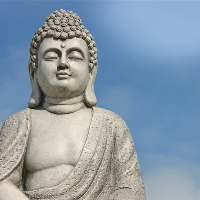It seems that I like this kind of spiritual literature very much. Since I can't practice yet, let stories practice for me and baptize me. Allow me to use the "book" as a bow, the spirit as an arrow, and the Brahman as the target of the arrow. I should shoot it unremittingly.
However, the story that Siddhartha, the main character, left Brahman and then left Shamen made me ponder, what is the purpose of practice?
In pursuit of truth? But what is the purpose of seeking truth? Let the truth bring common happiness to the world? If you can never realize the truth, is it equal to not having happiness or happiness? Truth always appears in the form of God, whether God knows truth or God is truth. If the creationism is established, what is the reason why truth is not allowed to become an inherent part of human beings?
Or to pursue happiness. Pursue eternal happiness. But what is the source of this happiness? Are you satisfied? The essence of all religions seems to be "happiness". Whether it is heaven, the nirvana, or the happiness brought by feeling the fullness of the "id"... however, this kind of happiness cannot be verified. Schopenhauer believes that the essence of happiness is no pain. The more we know, the more we will only be more aware of the limitations of our own cognition. In my opinion, this limitation is a kind of emptiness, which directly leads to pain. Is it true that at the end of the day, fools are lucky?
Both Schopenhauer and Hinduism (it seems that there is Buddhism? Forgive me for my one-sided knowledge, and I can't give more examples for the time being) believe that "suffering is the reality of life", and we will pursue our whole life away from suffering, so as to obtain happiness. "There is no end to suffering, and turning back is a shore." It once again shows that the world is a sea of suffering, but is it really a shore to understand "turning back" as "understanding the Tao"? Maybe we can understand "turning back" as putting aside our knowledge and what we have been lucky to have in the past, and facing the world with the most childlike attitude, so as to obtain the most genuine happiness.
Quote a thought from Siddhartha in the chapter "Awakening":
The wandering thinker asked himself, "What did you plan to learn from the Dharma and Master? What did you learn a lot, but what could you not really learn?" He finally found: "The answer is' I '. What I want to learn is the meaning and essence of' I '.' I 'is what I want to put off and win. 'I' is something that I cannot defeat, can only deceive, escape, and can only hide. really! There is nothing else in the world, like my 'I', which makes me puzzled. It is' I ', the mystery, that makes me alive, makes me different from others, and makes me Siddhartha! In the world, there is nothing I know more than 'I' and nothing I know more than Siddhartha! I know nothing about myself. Siddhartha has always been a stranger to me. Just because I'm afraid of myself, escape from myself! I have searched for Atman and Great Brahman. What I longed for was that 'I' would be dismembered and transformed, so that I could find the core of everything, find Atman, find life, and find the ultimate thing of divinity in a strange interior. But on this road, I lost myself. "
Including "Zarathustra", the three stages are: camel - lion - child. My interpretation of this is that camels are when people still believe in meaningless things, such as religious beliefs, the meaning of life, various rules, etc. The lion is of course the stage when people begin to identify with nothingness and maintain their strength; All religions or beliefs no longer constrain their actions or thoughts. The lions tried to get rid of all the restraints. The smiling child is nothingness itself, but it is positive and optimistic nothingness. When everything is completely meaningless, children are still pursuing happiness to get happiness, and remain happy without any reason or purpose.
When we need to feel and understand the essence of the world, it is always emphasized that we should forget "I". However, the last sentence of Siddhartha's soliloquy in the preceding paragraph no longer emphasizes the "I" of the id, and more importantly, it is really the real self. When I was a child, I was always selfish before being taught how to deal with the world. It seemed that I wanted to dominate everything, and I had to have what I wanted; In other words, they are selfish, only care about their own feelings, and self-centered. Only when we realize this and let go of our excessive interpretation and cognition of the world can we achieve real happiness. When we are not aware of the nothingness of the world, the nothingness of the id, and naive, when we are not subject to the restrictions of people around us, society and the world, only that kind of happiness is the most real and can reasonably exist in the world.
Perhaps the "id" that exists in me and I have been looking for and understanding hard is the whole world. And this me is the shore of the endless sea of bitterness.
